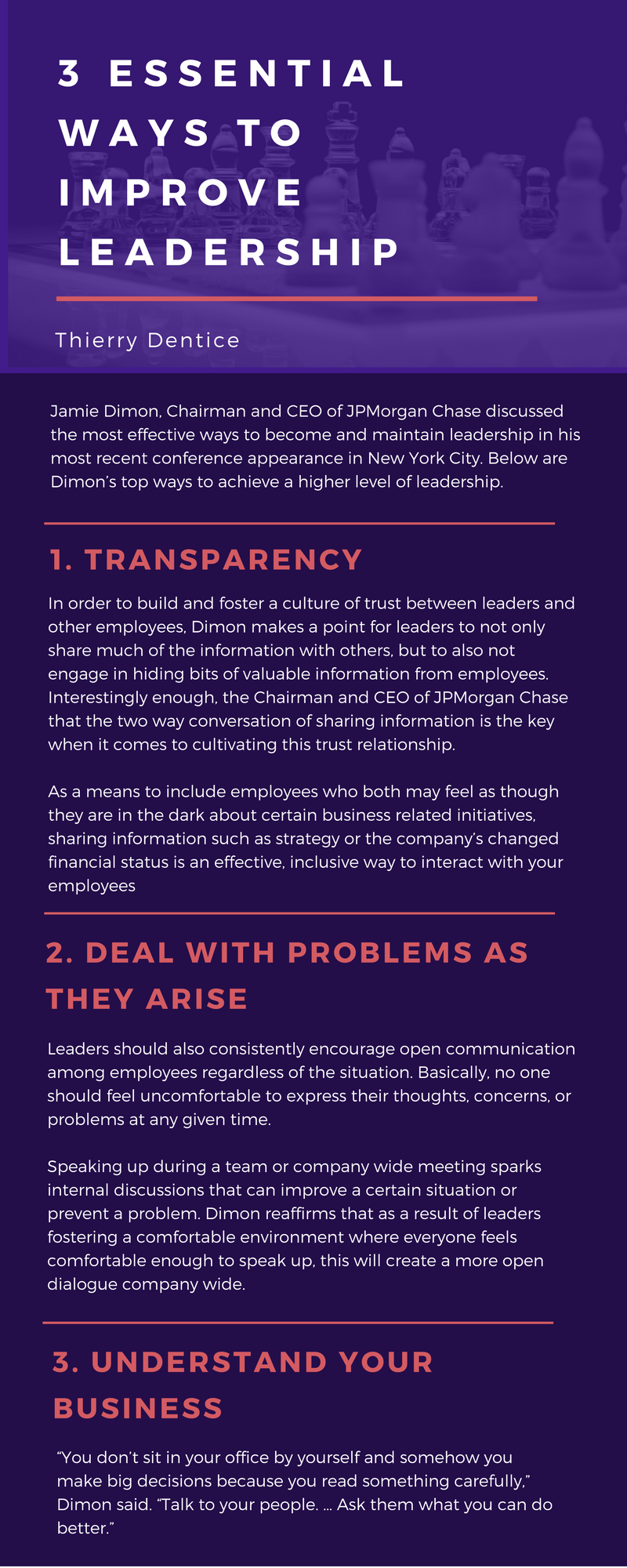Tag: Leader (page 2 of 2)
Flexibility
Breaking up the monotony of the work day is an important adaptation that companies should implement as workplace practices change. Evaluating employee efficiency on work actually produced rather the space which is completed is how both younger and more established companies are viewing the work from home situation.
Many companies have adopted make your own schedule policies and research shows that allowing employees to do so increases productivity. As each person has both extroverted and introverted qualities, and allowing employees a certain level of flexibility to work in their comfort zone is essential.
Believe it or not, many employees actually strive when offered with a work from home option to your employees is a great way to boost happiness. Offering all your employees the same benefit could add a new layer of potential brand loyalty in the future of the company’s culture.
Be transparent
Honesty is truly key when it comes to crafting effective leadership across multiple industries. Stressing over rumors of layoffs or fears of economic downturn only serve to disrupt an employee’s focus. Even if the only news you have to share is bad news, be honest. Instead of bottling up all the stress and unintentionally lashing out at employees, transparency will reduce anxiety for all parties involved.
Finding narrative
While it is true that younger employees do tend to switch jobs at a faster rate in order to gain experience, salary increases, etc., this does not necessarily mean that they are not in need of mentorship. Studies have shown that loyalty does indeed breed loyalty. Along with helping your employees see how the work they do benefits them, tailor advice and information in a way that has the biggest positive impact for them. Helping younger employees help you most effectively do your job is vital.
1. Two-way conversations
A great leader always communicates in a way where he/she allows for two way communication with other co-workers or employees. Conveying information in a concise but articulate manner is essential when it comes to highlighting success, receiving feedback, and making strides for improvement.
2. Attitude is everything
Maintaining a positive but realistic attitude both shapes your leadership in a conducive manner while also setting a great example for your team and your company. As you are a solid representation of the organization, making sure your attitude encourages others is essential.
3. Growing talent
Viewing your employees as valuable resources to be nourished and developed instead of business transactions will have two useful outcomes for the company. On one hand, these employees will be grateful that the company is expanding their skill set (webinars, seminars, workshops), and will directly become of more use to the company.
4. Motivate others
Providing a fair amount of emotional support for your team will incentivize performance in order for them to excel in every aspect of their day to day jobs. Some ways to motivate others include encouraging them to challenge their skillsets, acknowledging their successful efforts in a public space, and organizing events for team bonding.
5. Remain impartial
Try to your best to avoid engaging in any favoritism with any co-worker at the office. Remember to evaluate an individual based on his/her performance, how they challenge themselves, and the ways they want to improve the company’s mission. Showing impartial respect to others is the best form of effective leadership.
6. Set the standard
Establishing your legacy at the company is most effective when you lead with actions that support your strengths. Matching or exceeding the work ethic shown by your team members will also create an environment that promotes excellence and dedication to your craft.
7. Decisiveness
In addition to not allowing external factors to affect your decision making, be sure to take the time to support any decision you make with sound logic throughout the thought process. A successful leader can always support any decision with rationale.
8. Educate Yourself
A true leader never stops learning or challenging him/herself to understand the latest market trends or ways to improve the efficiency of a certain internal process. Whether it is reading the journal everyday or attending seminars on a monthly basis, leaders are always looking for ways to improve themselves.
With all this in mind, processing and implementing these tips will also allow you to become the type of leader that people not only admire, but would want to emulate in the future. Leadership is not only about making decisions for the team. It is strongly based on the notion to create an environment of mutual respect to produce a cohesive work environment for everyone.
The book titled “Traction” by Gino Wickman focuses on how to grow your company or “scale up” when the opportunity to expand presents itself. While research has shown that companies struggling to grow or expand find it difficult to break into their growth phase, gathering information from other leaders or entrepreneurs is a key step in order to assess what the appropriate steps are moving forward.
In addition to the insight given by Ken Dunn, here are some tips that any aspiring leader or current manager should actively implement in their day to day tasks. With this in mind, the below are three essential skills that managers, leaders, and other upper management officials need to be aware of as business expansion ensues.
Keep it simple
The best managers and leaders should have the useful skill of framing a very complex issue in simple terms. Though a skill that often times take months or years to develop, the right environment can help any leader acquire this important quality.
As these leaders will be required to guide a team throughout this new process, conveying intricate processes and difficult situations in plain language will not only help everyone comprehend what is going on around them, but will also make the complicated seem easy to understand.
Work with your team
Creating a two way working relationship with each of your teammates allows for both an easy information flow while also funneling growth to empower development. As a manager or leader, it is your job to find strengths in your subordinates in order to decipher how to best expand this skillset to the next step.
Each employee on your team has a different set of strengths, weaknesses, and areas of improvement, and it is essentially the manager primary goal to improve the subordinate in every way he/she can. As this is a huge part of your role, providing constructive criticism and a strategic approach to rectify this You can learn from everyone you manage.
Structure
The next step from the previous tip, managers also need to set goals for career-related growth as to make sure all their skills are properly utilized. Improving skills are in the best interest of both the employee and the company, and effectively bridging the two is vital for overall growth.
Henna Inam, a contributor on Entrepreneur.com, has shed light on interesting research regarding employee psych in the workplace. This research has shown if an employee is focused on his/her valuable purpose, this in turn creates a mental strength allowing us to become both more resilient and courageous when faced with stressful situations.
As a result of Inam’s extensive experience analyzing organizations’ structure, she has also compiled information pointing to what exactly sparks the difference between when coaching goals are met or missed.
1. Inspirational leaders take accountability
The single biggest differentiator in terms of making or hindering progress during the coaching process is how the leader takes or deflects this concept of accountability. Studies show that the most inspirational, successful leaders do not blame others, their colleagues or other circumstances, and instead rely on themselves to make the change they want to see. Thus, these leaders set an example by showing initiative when they see a fault in how to approach a specific obstacle.
2. Inspirational leaders connect with their purpose
Through the coaching process each leader connects with their authenticity. The leaders that practice bringing their unique strengths, purpose, and values into the office on a day to day basis exude admirable behavior. A useful, simple practice for leaders to connect themselves with their purpose is to craft a short list of skills or processes they need to accomplish before the day begins.
3. Inspirational leaders take appropriate action
At the root of it all, inspirational leaders are willing to challenge their habitual ways of behaving, and therefore try out a new approach when once isn’t being effective. In other words, they are willing to experiment and develop new parts of themselves to increase productivity, enhance their skills, and challenge their discomforts. Inspirational leaders ask themselves how to best approach a difficult situation before it occurs.
4. Inspirational leaders look for change
When change happens, transformational leaders practice finding the opportunity in whatever mishap may have occurred at that moment. Focusing on learning from a situation instead of ignoring it entirely will help you improve whatever skill sets you lack. This will allow leaders to focus their energy on enhancing qualities they have not had the chance to improve on in the past.
Emotional intelligence is a pretty recent concept. It was coined in 1990 in a research paper by John D. Mayer of UNH and Peter Salovey of Yale. It was later defined by Mayer in the Harvard Business Review thusly:
“From a scientific (rather than a popular) standpoint, emotional intelligence is the ability to accurately perceive your own and others’ emotions; to understand the signals that emotions send about relationships; and to manage your own and others’ emotions. It doesn’t necessarily include the qualities (like optimism, initiative, and self-confidence) that some popular definitions ascribe to it.”
Almost a decade later, Rutgers psychologist Daniel Goleman established the important connection between emotional intelligence and business leadership. In HBR’s 1998 article, “What Makes a Leader,” he states that the most effective leaders all have a high degree of emotional intelligence. IQ and technical skills are irrelevant when it comes to reaching an executive position.
Emotional intelligence has five major components:
- Self-awareness
- Self-regulation
- Motivation
- Empathy for others
- Social skills
Each of these components allow people to recognize, learn from, and connect with other people’s mental states.
According to HBR, understanding what constitutes emotional intelligence is important not only because it is so central to leadership, but because people who are strong in some components of it may be lacking in others. One example used by Salovey during a 2010 leadership conference was Bill Clinton, who was remarkable in his empathy yet devoid of self-control.
Mayer and Salovey coined the term “emotional intelligence” the same year that the functional magnetic resonance imaging machine was invented. For the first time, people could look at what was happening in the brain while it was functioning. Golemans extensive work on the subject of emotional intelligence is infused with findings from these studies. With that research Goleman and others have been able to further establish the connection between emotional intelligence and leadership.
They’ve been able to understand what physically happens to the brain when you understand what another person is saying, for example. They’ve also found definitively that emotions like anger can lead to bad decision making and that sometimes things like flattery simply do not work. All of these modes of research lead to a simple conclusion. In order to be a better leader you need emotional intelligence of a high degree.
There are still some counterarguments though, notably a Wharton progessor named Adam Grant who has reported that there is a lack of correlation between tests results measuring emotional intelligence and business results. His methods are obviously contested by Goleman and others.
With the business environment ever-evolving, how do you motivate, connect with, and inspire your team in the best, most effective way possible? Here are six practical tips that can be applied to a myriad of environments to help you become the most effective leader.
Practice compassion
When a mishap occurs, and it will, exercise compassion and empathy before coming down on your employee or jumping to conclusions. You should be hard on results, but soft on the person giving those results to you; understand what went wrong and how best to help that individual from making the same mistake again.
Trust your team
Experience has shown that staff will go above and beyond to keep an employer or managers trust, so give them all of it. Meddling in the minutiae of what your team is up to instead of giving them the tools and support they need tends to produce mixed results. So trust your staff, and they will produce great results.
Skill vs. Will
Underperformance usually comes from one of two places: a lack of skill or a lack of will. Taking time to uncover and understand the difference between the two in relation to a certain employee’s underperformance is key to fixing the problem. Skill gaps are easy to close with the proper coaching, training, and support, while will gaps are more difficult to close and require more digging into where your employees motivation lie.
Family first
Family issues are often unavoidable when managing a group of people, and allowing your team to make it their number one priority in dire times is key to performance. If they aren’t able attend to personal issues, performance will most likely suffer, and they’ll feel like their personal lives don’t matter outside of the work environment. They do, and let them know that.
Emphasize the why
When you outline why a project, assignment, client, etc., is so important, it helps gain buy-in from your team. It can motivate a team member to finish a project in a day as opposed to dragging it out over a few weeks. Letting them in on your rationale as well as your expectations helps team members feel they’re more valued.
Communicate frequently
While we all get caught up in our own daily tasks, personal lives, and the like, it’s important to make your team feel like they aren’t forgotten. Don’t wait for a quarterly or annual review to give feedback on performance, or even worse, for your team member to ask for it. Stay ahead of the ball, and regularly check-in with your staff to help them stay motivated, productive, and heard.





